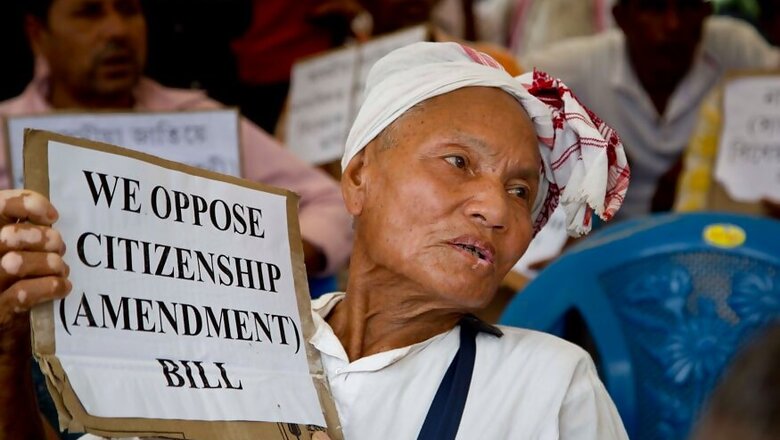
views
The controversy surrounding the new Citizenship Act is regarding the definition of “illegal migrant”, which following the amendment, is alleged to have become discriminatory to a particular religion and hence, directly violates Article 14 of the Indian Constitution.
Article 14 guarantees equality before the law and equal protection of law to every person in India. It means the state cannot discriminate between persons through state action; otherwise such a state action becomes void in light of the fundamental right guaranteed under the article.
Right to equality is a restriction on the powers of state. It defines the boundaries within which state action has to be confined. However, the restriction under Article 14 has an exception: unequal treatment to unequal persons.
The Constitution, acknowledging that inequalities exist in society and providing equal treatment to unequal persons lead to injustice, permits a state action which is discriminatory provided that such differentiation is based on an ‘intelligible differentia’ and such differentiation has a reasonable nexus with the objective sought to be achieved by the state action.
The term intelligible differentia distinguishes, reasonably, between persons or things that are grouped together from those that are left out of the group (see DS Nakara & Ors v. Union of India 1983 AIR 130).
Moreover, such differentiation must have a nexus with the objective sought to be achieved by the state action meaning that there must be an objective of a state action and the differentiation must be necessary to achieve that objective (Shri Ram Krishna Dalmia v. Shri Justice S.R. Tendolkar & Ors. 1958 AIR 538).
The new legislation has to pass the twin test of intelligible differentia and reasonable nexus in order to survive the test of Article 14.
The definition of ‘illegal migrant’ prior to the present amendment was meant for any foreigner who has entered into India without valid documents or has remained in India beyond the permitted time.
The latest amendment has added a provision that any person belonging to Hindu, Sikh, Buddhist, Jain, Parsi and Christian community from Afghanistan, Bangladesh and Pakistan, who entered India on or before the December 31, 2014, and who has been exempted by the central government under any relevant law shall not be treated as illegal migrant.
The amendment finds no mention of the Muslim community who would consequently not get the benefit of relaxation/exemption. Such exclusion has been perceived and debated to be an attack on the right to equality, secularism and thus, on Constitution. However, an analysis of the above law shows that it passes the test laid down in Article 14 in terms of intelligible differentia and reasonable nexus.
Intelligible Differentia
The amendment makes differentiation between two groups: one consisting of Hindu, Sikh, Buddhist, Jain, Parsi and Christian community and the other, Muslim.
The language of the proviso makes reasonable distinction between the two groups in a particular context which is discernible from the phrase “from Afghanistan, Bangladesh or Pakistan”. The amendment is restricted in terms of only three countries where Islam is the official state religion and the said communities form minority groups in those countries.
The differentiation in the proviso is, thus, based on the fact that it separates the minorities from the majority of these three countries. The minority communities in these countries have fear of persecution on the basis of religion and the differentiation becomes reasonable on humanitarian grounds.
Reasonable Nexus
The statement of object and reasons of the amendment states that Islam being the state religion of Pakistan, Afghanistan and Bangladesh, minority communities have faced persecutions there and many such persons have fled to India to seek shelter and have continued to stay in India.
The amendment seeks to provide protection to such individuals as many of them have incomplete or no document and are ineligible to apply for Indian citizenship under sections 5 or 6 of the Citizenship Act.
The protection is simply a relaxation provided to the persons belonging to specified groups who form minority communities in these countries and expedites the process of acquiring citizenship for them.
The amendment does not prohibit persons belonging to Muslim community from applying for citizenship of India. It does not ‘freshly’ declare foreign Muslims as illegal migrants. The position of foreign Muslims remains unchanged by the amended Act and only a relaxation to foreign persons belonging to minority communities of specific three countries has been provided based on a reasonable objective.
The debate surrounding the amendment also raises questions on inclusion of minorities from only three countries where Hindus are a minority. Other questions revolve around ignorance of the government to the fact that even certain groups within the Muslim community face persecution in these three countries.
However, the answers to such questions fall under the sphere of policy decision and are not the subject of Article 14 of the Constitution. So far as the constitutionality of the Amendment is concerned, it, in my opinion, passes the twin test laid down in Article 14.
(The author is an advocate practising in Supreme Court. Views expressed are personal.)




















Comments
0 comment